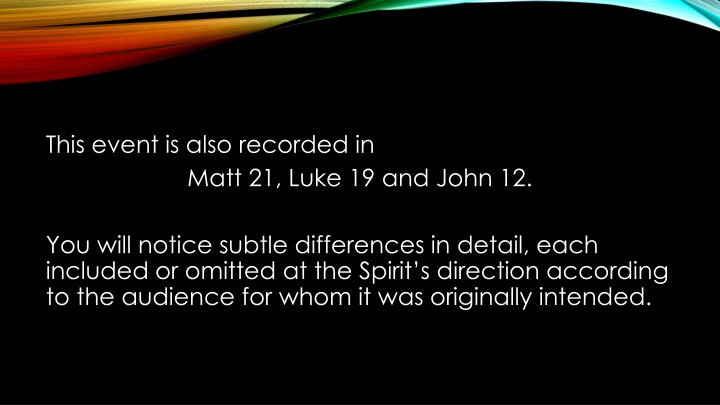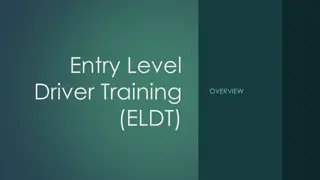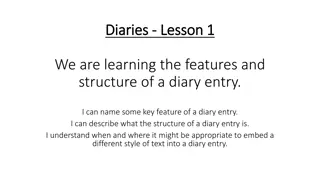The Triumphal Entry: Differences & Significance
Accounts of the Triumphal Entry in Matthew 21, Luke 19, and John 12, noting subtle variations shaped by audience and divine guidance. Delve into the symbolism, fulfillment of prophecy, and the crowds' expectations, culminating in a deeper understanding of the need for a deliverer.
Download Presentation

Please find below an Image/Link to download the presentation.
The content on the website is provided AS IS for your information and personal use only. It may not be sold, licensed, or shared on other websites without obtaining consent from the author.If you encounter any issues during the download, it is possible that the publisher has removed the file from their server.
You are allowed to download the files provided on this website for personal or commercial use, subject to the condition that they are used lawfully. All files are the property of their respective owners.
The content on the website is provided AS IS for your information and personal use only. It may not be sold, licensed, or shared on other websites without obtaining consent from the author.
E N D
Presentation Transcript
This event is also recorded in Matt 21, Luke 19 and John 12. You will notice subtle differences in detail, each included or omitted at the Spirit s direction according to the audience for whom it was originally intended.
CROSS CULTURE: DELIVERANCE Mark 11:1-11
ZECH. 9:9 Rejoice greatly, O Daughter of Zion! Shout, Daughter of Jerusalem! See, your king comes to you, righteous and having salvation, gentle and riding on a donkey, on a colt, the foal of a donkey.
Vs. 2 - 7 An animal that had never been ridden was especially appropriate for a holy occasion such as this. This action not only fulfilled prophecy but also clearly demonstrated Christ s mastery over all creation.
Vs. 8 Clothing: historic means of showing honor to a king. Their coats under his feet implied their willingness to submit to Him as King. Palm branches: Symbol of victory, triumph, joy and salvation. (A similar response came in 164 BC when Judas Maccabeus liberated Israel from Antiochus Epiphanes IV, self-proclaimed god manifest. See Maccabean Revolt; Hanukkah)
Vs. 9-10 See Psalm 118:25-26 Quoted at Triumphal Entry. Clearly Messianic. This song was sung at Passover and is oft-quoted in the NT Were they correct to hail him as Messiah? Absolutely! Isaiah 61:1-3 Luke 4:18-19 Today this Scripture is fulfilled (Isa. 29:18-19; 35:5-10)
OKAY, BUT Matt. 11:2-6 Are you the Coming One, or do we look for another? An understandable question, since he hadn t seen much judgment (See Matt. 3:1-12) But the crowd had seen and heard of the miracles Perhaps they hoped for a liberator like Judas Maccabeus
Make no mistake: They were absolutely correct in their assessment that they needed a deliverer. Their problem was that they so completely misunderstood their bondage and they misidentified their captor. Luke 19:37 for all the miracles they had seen
As a result, when Christ looked beyond their presenting issue and responded to their actual need, they came to the conclusion: Jesus of Nazareth is a joke We should kill him
They didnt understand that their struggle was not against flesh and blood, nor did they know their deepest need was spiritual. The Lord of Glory came to them, and they rejected Him in their disillusionment. Do you understand your greatest struggle and your deepest need, and do you understand that Jesus is rightly called the Deliverer? Will you trust Him to set you free?























